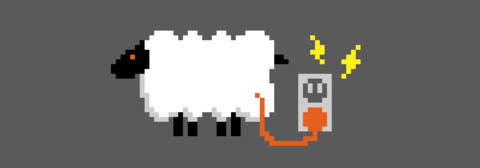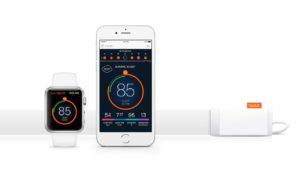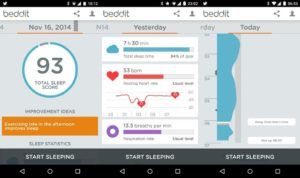Do Android Phones Dream of Electric Sheep?

We are tracked and monitored almost every waking moment, so why not when we sleep?
From the favorite and simultaneously infuriating alarm that starts our day to the last tweets or texts that end it, our smart phones have a ubiquitous presence in our lives. Even when we think we’ve final ly broken the spell as we eventually slip back into unconsciousness, our phones are still hard at work keeping track of our every move (or lack thereof) with the help of Beddit.
ly broken the spell as we eventually slip back into unconsciousness, our phones are still hard at work keeping track of our every move (or lack thereof) with the help of Beddit.
Beddit, using a hardware device coupled with a smart phone software interface, attempts to data mine while you dream.
Considering sleep occupies approximately one third of our entire existence, it was only a matter of time in today’s data driven and digitized world that we would eventually start tracking it. This inevitability, however, is not devoid of rationality and, more importantly, necessity. Just within the last year, the Centers for Disease Control and Prevention (CDC) identified sleep insufficiency as a public health problem that is directly linked to automobile accidents, industrial disasters, and medical or other occupational risks [1]. Apart from the societal risk, the Institute of Medicine discovered a relationship between poor sleep and the likelihood of a person to suffer from a chronic disease such as hypertension, diabetes, depression, and obesity as well as cancer, increased mortality, and reduced quality of life and productivity [2].
Not surprisingly, health professionals consider sleep one of the  three fundamental pillars of a person’s overall wellbeing. However, when compared to the other two pillars of nutrition and fitness, sleep tracking and overall awareness have lacked exposure and traction in the market.
three fundamental pillars of a person’s overall wellbeing. However, when compared to the other two pillars of nutrition and fitness, sleep tracking and overall awareness have lacked exposure and traction in the market.
Unlike nutrition and fitness that primarily involve conscious decisions, monitoring and then also improving sleep is a different, more complicated challenge. Many health care professionals agree that current sleep troubles are inherent to today’s world of data driven and caffeine induced lifestyles which is further exacerbated by blue lit smart phones that disrupt a person’s natural circadian cycle [3]. By using a bit of the “hair of the dog” philosophy, Beddit attempts to tackle this problem and track sleep through your phone by utilizing an ultra-thin sensor that lies under the bed sheets. This device monitors multiple data points including heart rate, sleep duration, sleep quality, snoring, and sleep environment. The data then syncs to an app on your smart phone via Bluetooth and can be aggregated and analyzed so that you can begin to understand how effective or troubled your time in unconsciousness actually is [4].
This awareness of a prior unknown can have far reaching health implications and could potentially and drastically improve the quality of a user’s life. Undiagnosed problems such as restlessness and sleep apnea can get discovered, and people can uncover, using trial and error, their unique and optimal sleep environment. Beddit is also working with sleep specialists to update their sleep coaching interface to offer users recommendations on how they can improve the quality of their sleep and interpret the data that their device is collecting [5].
Compared to other sleep analytic tools like FitBit, which has tried to couple its wearable fitness tracker with sleep monitoring, Beddit doesn’t depend on wearable technology which some users could find cumbersome or uncomfortable while sleeping. Also, unlike other systems that just use their smartphone’s embedded sensors, Beddit’s separate, unnoticeable device claims to be more sensitive and accurate.
One weakness of Beddit’s operational model is its one dimensionality and scope. More sophisticated, clinical sleep  trackers utilize polysomnography (PSG) that measure brainwaves (EEG) and eye movement (EOG) along with several other biological data points [6]. Although it would be difficult to replicate in a home setting, offering an optional wearable headband or hybrid eye mask device could supplement the data already provided by the movement and heart rate sensor and provide a better diagnostic tool for the user or a health professional.
trackers utilize polysomnography (PSG) that measure brainwaves (EEG) and eye movement (EOG) along with several other biological data points [6]. Although it would be difficult to replicate in a home setting, offering an optional wearable headband or hybrid eye mask device could supplement the data already provided by the movement and heart rate sensor and provide a better diagnostic tool for the user or a health professional.
Given the trajectory of big data and monitoring technology, I think we’ll eventually see a consolidation of tracking devices, both wearable and passive, that will monitor a user holistically throughout the day and aggregate multiple biological and environmental data points into usable information that highlight optimal or unhealthy behaviors. This data could then eventually be wirelessly transmitted and provided to a user’s own PCP who could be alerted of deteriorating conditions or symptoms that require a pressing medical need or intervention. Imagine the possibility of an automated medical secretary calling you in the middle of the night to preemptively alert you of an impending heart attack. Providing more data naturally sacrifices privacy, but the rewards may outweigh the risks.
You may be able to sleep more soundly at night knowing that your smart phone is always watching (just check your Beddit app to verify when you wake up).
Word Count: 781
Sources:
- CDC.gov. 2016. Insufficient Sleep Is a Public Health Problem | Features | CDC. http://www.cdc.gov/features/dssleep/, accessed November 2016.
- Institute of Medicine. Sleep Disorders and Sleep Deprivation: An Unmet Public Health Problem. Washington, DC: The National Academies Press; 2006.
- Harvard Health. 2016. Blue light has a dark side – Harvard Health http://www.health.harvard.edu/staying-healthy/blue-light-has-a-dark-side, accessed November 2016.
- Business Insider. 2016. Beddit – Business Insider http://www.businessinsider.com/beddit-2013-11, accessed November 2016.
- Beddit FAQ. 2016. Beddit FAQ. http://www.beddit.com/faq/, accessed November 2016.
- Polysomnography (sleep study) – Mayo Clinic. 2016. Polysomnography (sleep study) – Mayo Clinic . http://www.mayoclinic.org/tests-procedures/polysomnography/basics/definition/prc-20013229, accessed November 2016.
Photos (in order presented):
https://store.dieselsweeties.com/products/electric-sheep-shirt
http://thenextweb.com/reviews/2015/10/30/review-the-beddit-smart-sleep-monitor-says-i-need-a-nap/
http://isdhealthsolutions.com/store/in-lab-sleep-test/in-lab-psg-sleep-study/



Great article — I’ve personally used Jawbone and Whitings Aura to track my sleep and it’s incredible to see the result. While there’s some debate on whether the data is completely accurate, I’m more curious to see your views as to what value besides data tracking this device could have. The Aura serves as more than just a tracker, it provides lights/alarms to wake you up at the right REM sleep and monitors external factors like temperature and Co2 levels in order to recommend changes in the environment that you could implement and improve the sleep.
Do you have other recommendations for how these devices can become more than just trackers?
In the screenshot of Beddit application, I noticed that it shows heart rate bpm. I’m wondering how the device captures this by only using an sensor under the bed sheet that does not have contact with the skin? I would love to compare Beddit’s heart rate data with say that of a FitBit to see if they match.
In addition to providing the user a lot of data about their sleep (I really like the “sleep score”), how can Beddit help users actually correct behavior and get better sleep? I think it could be good for Beddit to integrate gamefication concepts to its tracking software. For instance, if a user “levels up” by achieving a sleep score of 80+ every day for a week, and the user can share his achievement with his family and friends.
I totally agree that it’s odd that society is only now starting to think of sleep in the same obsessive way that we have regarded nutrition and exercise in recent decades. I do worry in some ways however that, through the use of such devices, apps etc, we are burrowing down on sleep quality to ultimately allow us to minimise the quantity side of the equation. Only through a cultural acceptance that five or six hours sleep a night is a bad thing for the vast majority of the population will we start to right that equation. I would love to see a return to the old concept of 24 hours being split into three equal sections of 8 hours for work, play and sleep!
Thanks for the post! I remain pretty skeptical of sleep-tracking apps and devices, at least until as mc23 and cranberryfarmer8 pointed out, there is value beyond basic data tracking. I used to have a Fitbit that monitored my sleep…and it was useless. Whether or not I believed in the quality of the data (sounds like Beddit would be more accurate), I wasn’t sure what to do with my results. Great, I slept for 7 hours and woke up 4 times…how am I supposed to fix that? Is waking up 4 times normal? If I don’t remember waking up, does it actually matter?
I agree that sleep is one of the next big health areas tech companies are trying to “hack”, but I just don’t see how many of them can offer actionable steps to improve sleep quality. I’m not sure gameification is the way to go, but I think getting some feedback on the physiological elements of body position during sleep could be useful. Maybe there are devices that can address that!
Really loved this post, I have used this technology before and it truly is insane that they can track your sleep just from the vibrations and sounds in your bedroom. My one issue with the technology is that is does feel an little invasive into one’s life, because you have to set it every night before you go to bed, and adjust the noises and alarms which are at the moment clunky. I would love to see an automatic setting that can turn this on at certain times so you don’t have to think about it, because it seems that every time I think about this app it actually keeps me from sleeping as I stress about how much sleep I will get that night, the quality of the sleep, and how tired I am going to be tomorrow if I don’t fall asleep at this very instant.